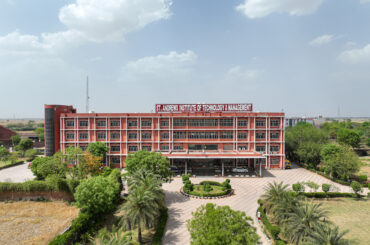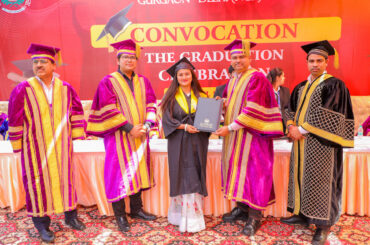MBA in Information Technology
An MBA in IT is an advanced degree that merges business management expertise with knowledge in information technology. It’s designed to prepare graduates for leadership roles in tech-driven environments.
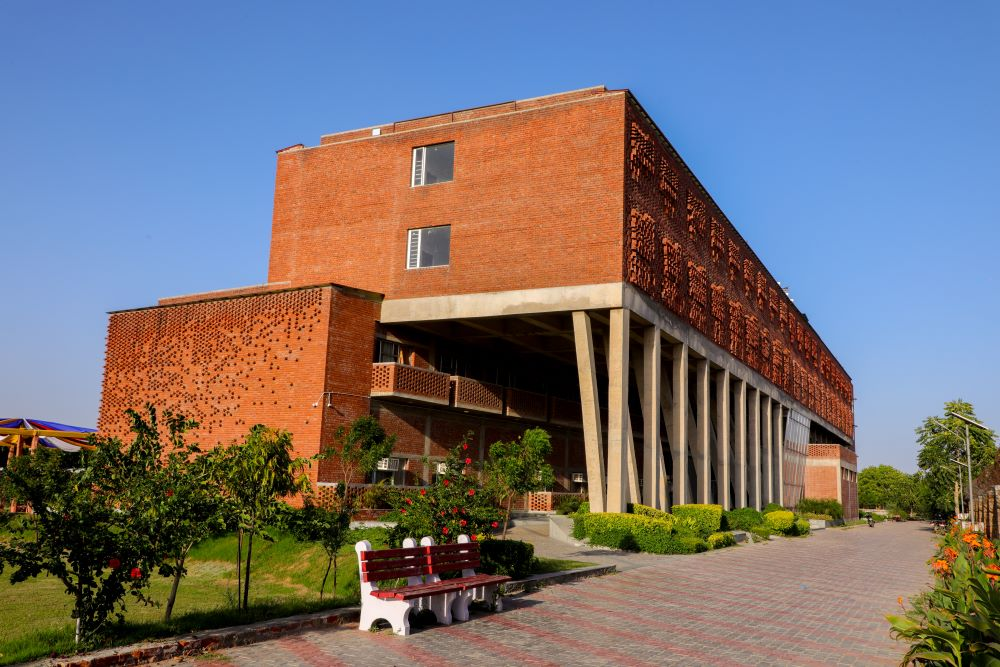
Image – 1 Management Block at SAITM Campus
Full Form of MBA: The full form of MBA is “Master of Business Administration.”
Core Areas of an MBA in IT:
Business Core: Traditional MBA courses covering areas like marketing, finance, human resources, and strategic management.
IT Specialization: Courses tailored to IT, such as systems management, cybersecurity, software project management, and data analytics.
Objectives:
Strategic IT Planning: Understanding how to align IT strategies with business objectives.
Leadership Skills: Developing managerial skills tailored to IT environments.
Technical and Business Expertise: Gaining both technical IT skills and broad business knowledge.
Career Paths:
- Chief Information Officer (CIO)
- IT Manager
- Business Analyst
- Systems Analyst
- Technology Consultant
Some of the most opted courses in India and St. Andrews college or different Engineering college or Management colleges are as follows:-
- Btech
- Btech CSE
- Btech ETCE
- MTech
- BCA
- BBA
- MBA
- MCA
- DPharma – St. Andrews College of Pharmacy
- BPharma – St. Andrews College of Pharmacy
- BArch – St. Andrews College of Architecture
MBA in IT Eligibility Criteria in India

Image – 2 Inside View of Management Block
In India, the eligibility criteria for enrolling in management courses for a regular MBA in IT may vary slightly among institutions. Nevertheless, there are several common requirements that generally apply across various institutions, including universities and colleges.
Educational Qualification:
- Candidates must hold a Bachelor’s degree in any discipline from a recognized university or college.
- The minimum percentage required in the undergraduate degree typically ranges from 50% to 60%, with some relaxation for reserved categories as per the government norms.
Entrance Exams:
- Admission to MBA courses in IT often requires scores from entrance exams. The most commonly accepted exams are:
- CAT (Common Admission Test): Widely accepted by premier institutes like IIMs and many other universities.
- CMAT (Common Management Admission Test): Conducted by the National Testing Agency for admission to MBA courses in various colleges.
- MAT (Management Aptitude Test): Conducted by All India Management Association and accepted by a large number of business schools.
Work Experience:
- While not mandatory for all institutions, some business schools prefer or require candidates to have some work experience, particularly for executive MBA courses. This experience helps in understanding the practical aspects of business and technology management.
English Proficiency:
- Although not universally required, some institutions might expect proficiency in English, which can be demonstrated during the personal interview or group discussion stages.
Additional Requirements:
- Personal Interviews (PI), Group Discussions (GD), and Written Ability Tests (WAT) are often part of the selection process after the entrance exams.
- Leadership qualities, extracurricular activities, and other personal achievements may also be considered.
Admission Process for MBA in IT
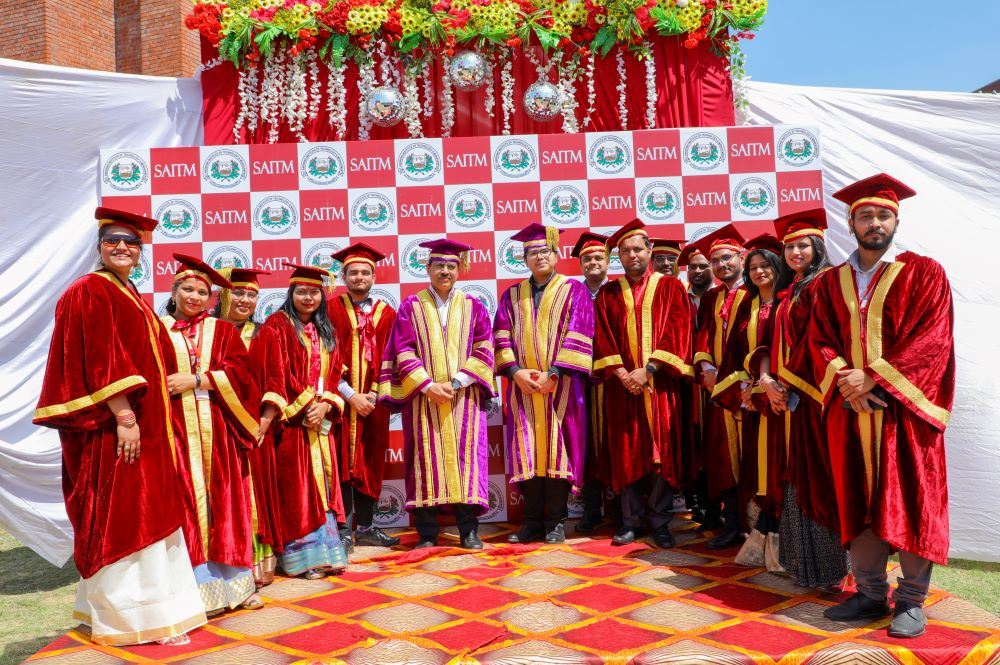
Image – 3 Convocation Ceremony
The admission process for an MBA in IT in India involves several stages, from entrance examinations to final selection rounds. Here’s a detailed step-by-step overview of the typical admission process:
1. Meet Eligibility Criteria
Ensure you meet the basic eligibility requirements, which usually include holding a Bachelor’s degree from a recognized university with a minimum percentage (typically 50% to 60%, with relaxation for reserved categories).
2. Entrance Exams
Register and Prepare: Choose and register for one or more relevant MBA entrance exams. Commonly accepted tests include CAT, CMAT, MAT, XAT, and state-specific exams like MAH-CET for institutions in Maharashtra.
Take the Exam: Prepare and sit for the exam. Performance in these exams is crucial as it significantly influences your chances of securing admission to a good program.
3. Application to Colleges
Shortlist Colleges: Based on your entrance exam scores, shortlist colleges that offer an MBA in IT and for which you qualify.
Submit Applications: Apply to the selected colleges, often through their individual application processes. This might involve filling out detailed application forms, submitting essays, and providing letters of recommendation.
4. Selection Rounds
After initial screening based on entrance exam scores, shortlisted candidates are usually called for further rounds, which may include:
Group Discussions (GD): Assessing communication skills, group dynamics, and logical reasoning.
Personal Interview (PI): Evaluating interpersonal skills, academic background, work experience, and fit for the program.
Written Ability Test (WAT): Testing ability to think critically and communicate effectively in writing.
5. Merit List and Offers
Merit List: Based on a combination of entrance exam scores, performance in GD, PI, and sometimes past academic record and work experience, colleges will release a merit list of selected candidates.
Offer of Admission: Candidates who make it to the merit list will receive admission offers. You may need to confirm your acceptance by paying a fee or meeting other conditions specified by the institution.
6. Enrollment
Upon accepting the offer, complete any remaining formalities such as document verification, registration, and payment of tuition fees to enroll in the program.
7. Orientation and Commencement
Participate in orientation programs, if any, before the official commencement of classes.
MBA in IT Fees Structure

Image – 4 SAITM Dining Hall
In India, the fee structure for an MBA in IT varies significantly across different institutions. These can range from relatively affordable at government institutions to quite expensive at top private business schools. Here’s a breakdown of what you might expect:
Government or Public Institutions:
- Indian Institutes of Management (IIMs): The fees at the IIMs are generally on the higher side for Indian public institutions. For an MBA in IT or a related field, the total program fee can range from about INR 10 lakh to INR 23 lakh for the complete course.
- Other Central or State Universities: These universities often have lower tuition fees, which might range from INR 2 lakh to INR 10 lakh for the entire program, depending on the university and its location.
Private Institutions:
- Top Private Business Schools: Institutions like ISB, XLRI, and MDI, which are known for their high-quality MBA degrees, might charge anywhere from INR 15 lakh to INR 30 lakh for a two-year MBA program.
- Mid-Tier Business Schools: Schools in this category may charge between INR 5 lakh to INR 15 lakh for the complete program.
Factors Influencing Fees:
- Infrastructure and Facilities: Institutions with state-of-the-art facilities, extensive libraries, and advanced technology tend to charge higher fees.
- Faculty and Pedagogy: Schools with experienced faculty and innovative teaching methods may also have higher fees.
- Location: Business schools located in metropolitan areas like Mumbai, Delhi, Bangalore, and Hyderabad might have higher fees due to higher operating costs in these locations.
Additional Costs:
Besides tuition fees, students should also consider additional costs such as:
- Hostel and Accommodation: On-campus housing can range from INR 1 lakh to INR 3 lakh per year.
- Books and Study Materials: Approximately INR 10,000 to INR 50,000 per year.
- Miscellaneous Fees: Including registration fees, exam fees, and other administrative costs.
Financial Assistance:
Many business schools provide scholarships, financial assistance, and educational loans to support students in handling the expenses associated with the MBA degree. These aids could be either merit-based or need-based, and they play a vital role in alleviating the financial strain for individuals pursuing the business course.
MBA in Information Technology Entrance Exams
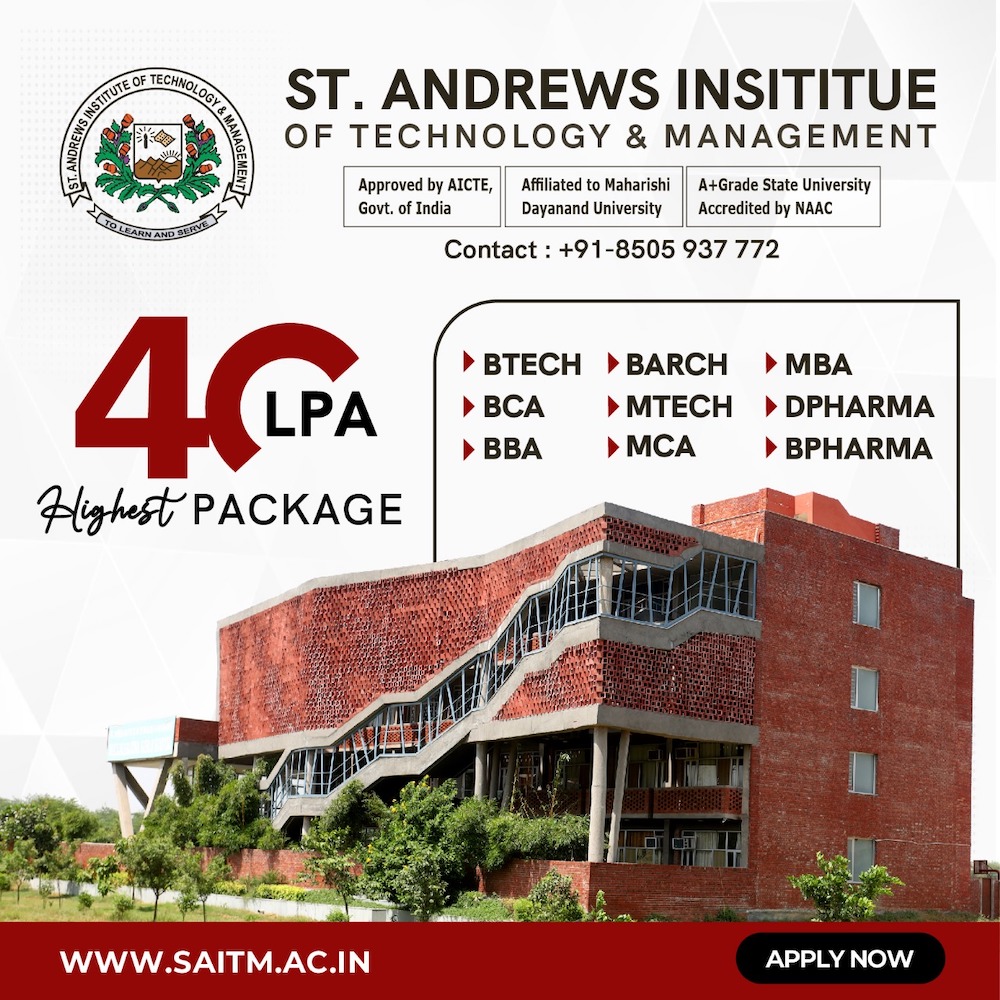
Image – 5 Courses Overview
For pursuing an MBA in IT in India, several entrance examinations are key to gaining admission into reputable business schools. Each of these exams evaluates different aspects of a candidate’s abilities, such as quantitative skills, verbal reasoning, and analytical thinking. Here’s a detailed overview of the primary entrance exams used for MBA admissions in India:
1. CAT (Common Admission Test)
- Conducted by: Indian Institutes of Management (IIMs)
- Purpose: This is the most prestigious MBA entrance exam in India, used for admission to the IIMs and numerous other business schools across the country.
- Focus Areas: Quantitative Ability, Verbal Ability and Reading Comprehension, and Data Interpretation & Logical Reasoning.
2. CMAT (Common Management Admission Test)
- Conducted by: National Testing Agency (NTA)
- Purpose: A national-level entrance exam whose scores are accepted by many AICTE-approved institutions.
- Focus Areas: Quantitative Technique, Logical Reasoning, Language Comprehension, and General Awareness.
3. MAT (Management Aptitude Test)
- Conducted by: All India Management Association (AIMA)
- Purpose: Accepted by a large number of business schools across India.
- Focus Areas: Mathematical Skills, Critical Reasoning, Language Comprehension, Data Analysis and Sufficiency, and Indian and Global Environment.
Syllabus for MBA in IT
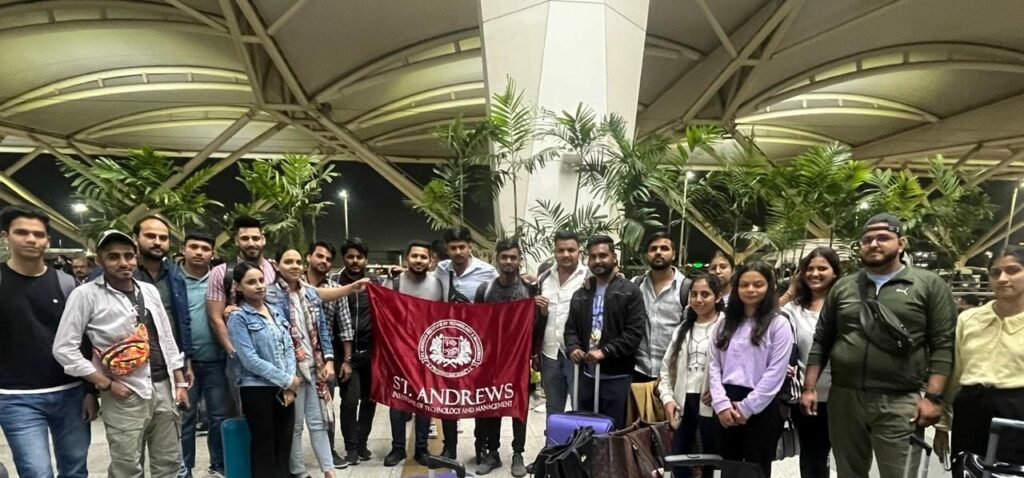
Image – 6 Management Students International (DUBAI) Industrial Visit
An Master of Business Administration (MBA) in IT in India is designed to blend management skills with advanced IT knowledge, preparing students for leadership roles in the tech-driven business environment. The course syllabus for an MBA in IT typically encompasses a wide array of subjects, offering a blend of fundamental business management principles and specialized IT skills. While the exact curriculum can vary between institutions, here is a general outline of the subjects you might encounter in an MBA in IT program:
Core Management Subjects
These form the foundation of any MBA course and cover essential business and management skills:
Organizational Behaviour: Understanding the behaviour of individuals and groups within organizations.
Marketing Management: Strategies and techniques for marketing effectively in various business environments.
Financial Management: Essential financial skills, including corporate financial planning, analysis, and control.
Human Resource Management: Theories and practices in recruitment, training, and development of employees.
Operations Management: Managing the process of production and business operations efficiently.
Strategic Management: Long-term planning and business strategy development.
Economics: Microeconomics and macroeconomics concepts relevant to business decisions.
Specialized IT Subjects
These subjects focus specifically on information technology and its application in business:
Management Information Systems (MIS): Study of information systems and their role in business decision-making.
Database Management Systems (DBMS): Technical and managerial aspects of database systems and data management.
Enterprise Resource Planning (ERP): Integration of core business processes, often using specialized software and technology.
Systems Analysis and Design: Methodologies for analyzing and designing information systems to meet organizational needs.
E-Business: Strategies and models for conducting business over the internet, including e-commerce.
Data Analytics and Business Intelligence: Techniques and tools for transforming data into actionable business insights.
Network and Systems Security: Principles of protecting computer networks and systems from cybersecurity threats.
IT Project Management: Specific methodologies like Agile and Scrum for managing technology projects.
Electives and Specializations
Many programs offer electives or specializations that allow students to focus more deeply on areas of particular interest to them, such as:
- Cloud Computing
- Artificial Intelligence
- Digital Marketing
- Cybersecurity Management
- Telecommunications Management
Capstone Projects and Internships
To round out the practical application of theoretical knowledge, many MBA programs include:
Capstone Project: A large-scale project that often involves solving a real-world problem or developing a comprehensive business plan.
Internship: Hands-on work experience in a company’s IT department or IT-related projects.
MDU Rohtak Syllabus for MBA in IT
| Semester I | |
| Management Concepts and Organizational Behavior | Managerial Economics |
| Accounting for Managers | Business Statistics and Analytics |
| Operations Management | Computer Fundamentals and Office Automation Tools |
| Business Environment | |
| Elective Subjects | |
| Business Communication Skills | Event Management |
| Semester II | |
| Financial Management | Business Research Methods |
| Marketing Management | IT Infrastructure Management |
| Human Resource Management | Comprehensive Viva-voce |
| Elective Subjects | |
| Entrepreneurship | Creativity and Innovation Management |
| Semester III | |
| CORE COURSES | |
| Strategic Management | Operations Research |
| Corporate Laws | Summer Training Report |
| Discipline Specific Elective Courses (specialization areas offered under dual specialization scheme) | |
| E-Commerce and Applications | Multimedia and Web Development |
| Data Ware Housing and Data Mining | Enterprise Resource Planning |
| E-Governance and Framework of ICT | |
| Semester IV | |
| CORE COURSES | |
| B2B Marketing | Project Report |
| CSR and Business Ethics | Comprehensive Viva-voce 1 |
| Discipline Specific Elective Courses (specialization areas offered under dual specialization scheme) | |
| Knowledge Management | Programming in Visual Basic |
| Information Security and Cyber Laws | E-Business
Information Systems Management |
| Systems Analysis and Design |
Table – 1 Syllabus for MBA in IT
Types of MBA in IT
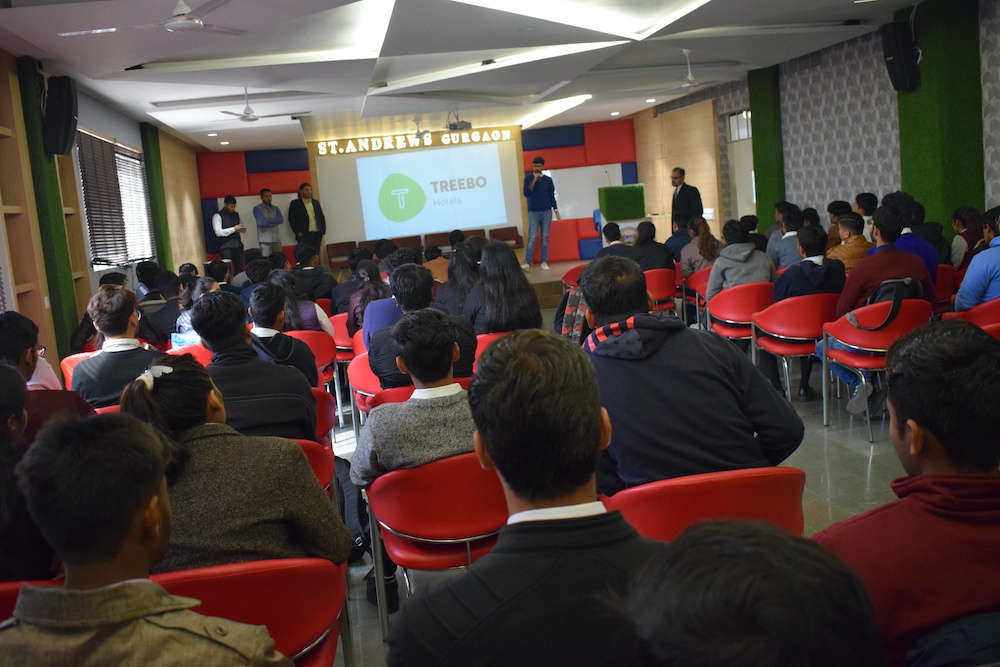
Image – 7 Present a Seminar by TREEBO Hotels for Management Students
An Master of Business Administration (MBA) in Information Technology is tailored to blend the strategic business acumen of an MBA with specialized knowledge in the application and management of information technology. This specialized program aims to bridge the divide between business and technology, equipping graduates for leadership positions overseeing technology-driven business strategies. Detailed types of MBAs within Information Technology focus on imparting practical knowledge in this intersection.
MBA in Information Technology Management:
- This program focuses on the administrative aspects of IT and how to manage teams, projects, and technology strategies effectively.
- Graduates often move into roles like IT Director, CTO, or IT Project Manager.
MBA in Information Systems:
- Concentrates on systems analysis, design, and implementation, along with integrating IT solutions to support business operations.
- This specialization is ideal for careers such as IT Analyst, IT Consultant, or CIO.
MBA in Data Analytics or Business Analytics:
- This type of MBA emphasizes quantitative methods, statistical analysis, and data interpretation to make business decisions.
- It prepares students for positions like Data Scientist, Business Analyst, or Analytics Consultant.
MBA in Technology Innovation or Technology Management:
- Focuses on fostering innovation through new technologies and managing technological changes within organizations.
- Graduates are well-suited for roles in technology leadership, innovation management, or as entrepreneurial leaders in tech startups.
MBA in Cybersecurity:
- Integrates the principles of business management with the critical aspects of information security.
- Positions targeted by this specialization include Cybersecurity Analyst, Information Security Manager, or Chief Security Officer.
MBA in Enterprise Resource Planning (ERP):
- Focuses on ERP systems, which are essential for overseeing daily business functions like accounting, procurement, task coordination, and supply chain operations.
- Career paths often include ERP Analyst, ERP Consultant, or ERP Project Manager.
MBA in E-Commerce and Digital Business:
- This specialization explores the economic and managerial aspects of digital businesses and e-commerce platforms.
- Suitable roles include E-Commerce Manager, Digital Marketing Manager, or Digital Project Manager.
Top Colleges for MBA in IT
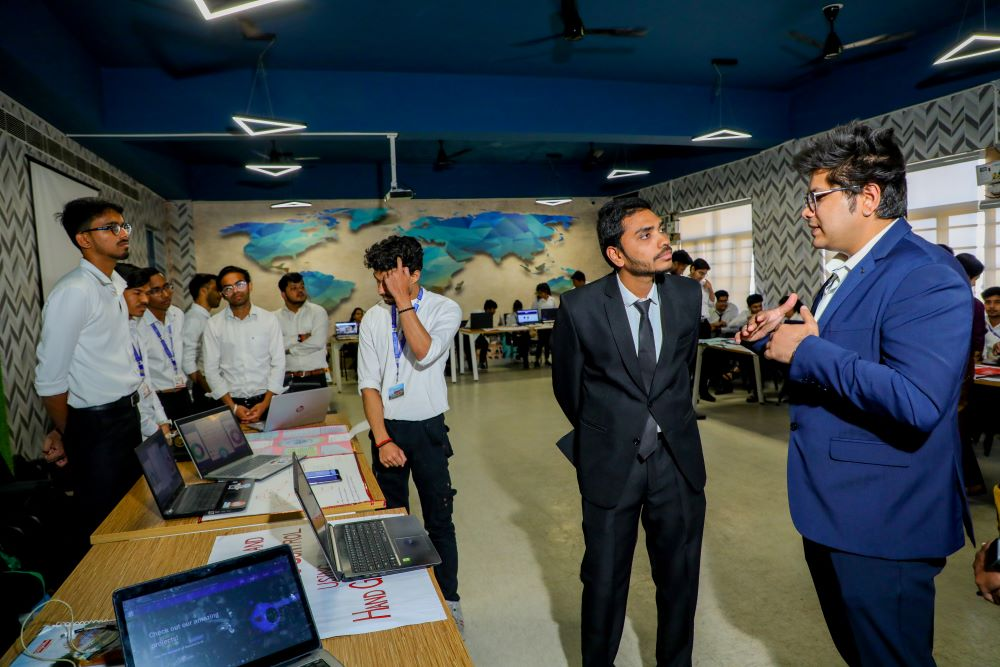
Image – 8 Discussion About the Projects
India hosts several prestigious institutions offering top-notch MBA courses in Information Technology.
These programs are well-regarded due to their comprehensive curriculum, excellent faculty, and strong industry connections that facilitate impressive placement records.
Here’s a list of some of the top colleges in India where you can pursue an MBA in IT:
1. Indian Institutes of Management (IIMs)
- IIM Bangalore: Offers an MBA in Business Analytics, focusing on IT and data analysis.
- IIM Calcutta: Known for its Post Graduate Diploma in Business Analytics (PGDBA), a collaboration between IIM Calcutta, IIT Kharagpur, and ISI Kolkata.
2. St. Andrews Institute of Technology and Management (SAITM), Gurgaon
- Emerging as a notable institution offering programs in Information Technology and Management, tailored to equip students with the necessary skills for the evolving business and IT landscapes.
3. Xavier Labour Relations Institute (XLRI), Jamshedpur
- Offers a General Management program with a specialization in Information Systems.
4. S.P. Jain Institute of Management and Research (SPJIMR), Mumbai
- Features an Information Management specialization in its PGDM program.
5. National Institute of Industrial Engineering (NITIE), Mumbai
- Known for integrating aspects of technology management in its PG Diploma in Industrial Management.
6. Indian School of Business (ISB), Hyderabad
- Provides a comprehensive Post Graduate Program in Management (PGP) with electives in Information Technology.
These institutions provide a mix of established and emerging options for students seeking specialized education in Information Technology within the MBA framework.
Each offers unique strengths, from traditional business analytics to contemporary IT management, making them suitable for a range of aspirations and career paths in the tech-driven business world.
Career Scope after MBA in IT
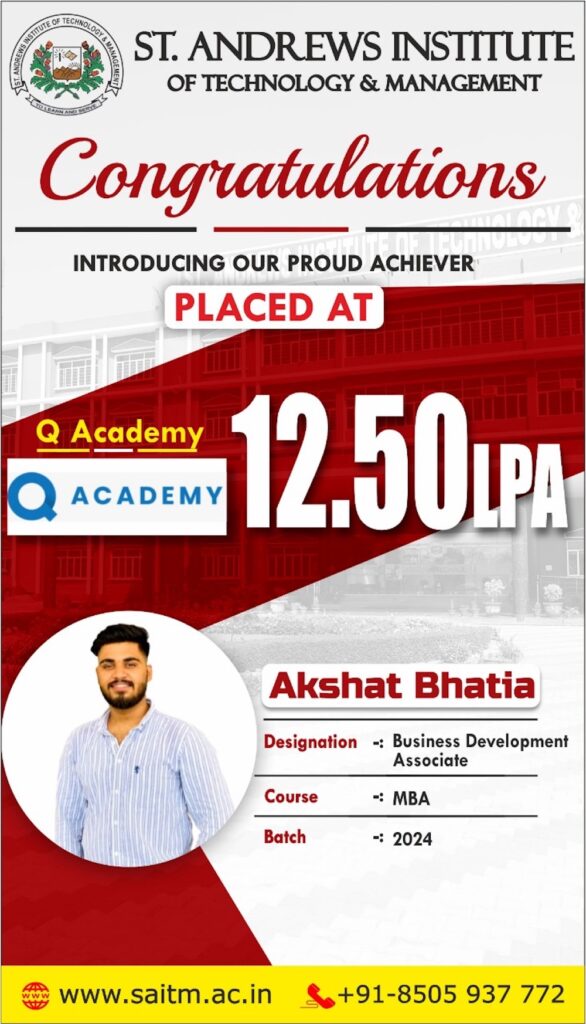
Image – 9 MBA Student Placed as a Business Development Associate
An MBA in IT provides graduates with a distinctive combination of business insight and technological proficiency, rendering them in high demand across diverse sectors of the economy. Here’s an overview of the job opportunities and potential roles for graduates of this program:
Key Roles and Industries
IT Manager/Consultant: Oversee the IT needs of an organization, including managing systems implementation, IT infrastructure, and the IT team. IT consultants offer advice and expertise to organizations to help them improve their IT systems and processes.
Project Manager: Responsible for planning, executing, and closing projects related to IT services or product development. This role demands skills in both project management and a deep understanding of technology.
Systems Analyst: Works to design and implement information systems solutions that fit the organizational strategies. This role involves analyzing and recommending technology solutions to improve business efficiency.
Business Analyst: A vital connection between IT capabilities and business goals, business analysts assist companies in enhancing processes, products, services, and software through analytical insights.
Chief Information Officer (CIO): As a C-level executive, the CIO directs the planning and implementation of enterprise IT systems in support of business operations to improve cost-effectiveness and service quality.
Data Analyst/Data Scientist: Specializes in analyzing data to aid decision-making. This role uses a combination of programming, statistical skills, and domain knowledge to extract insights from data.
Cybersecurity Manager: Responsible for protecting an organization’s systems, networks, and data from cyber attacks. This role is increasingly important as cyber threats continue to escalate.
Product Manager: Oversee the development and lifecycle of a tech product. This role blends elements of technology, business, and user experience to create products that meet market demands.
E-commerce Manager: Oversee online sales strategies and operations for a business. This includes managing web traffic, optimizing online sales processes, and customer experience.
IT Entrepreneur: Start or lead technology startups, using innovation and business strategy skills gained during the MBA.
Industries Benefiting from MBA in IT Graduates
Technology: Companies like Google, Amazon, Microsoft, and startups across the tech spectrum.
Consulting: Firms like Accenture, Deloitte, and PwC hiring for tech consulting roles.
Financial Services: Banks and financial institutions increasingly rely on technology for fintech innovations, requiring MBA IT graduates for both strategy and implementation.
Healthcare: With the rise of telemedicine and digital health records, healthcare providers need professionals who can merge IT with healthcare efficiently.
Manufacturing: Implementing IoT, AI, and other technologies to improve production and operations.
Skills that Enhance Career Opportunities
Technical Proficiency: Knowledge of programming languages, database management, and networking.
Analytical Skills: Ability to analyze large datasets and extract actionable insights.
Leadership and Communication: Skills to lead teams and communicate technical concepts to non-technical stakeholders.
Project Management: Certifications like PMP can enhance a resume, as well as skills in Agile and Scrum methodologies.
Pursuing an MBA in IT not only equips individuals with the skills to navigate technological advancements but also fosters a solid understanding of business strategies, laying the groundwork for a successful career. Graduates emerge as valuable assets in nearly every industry, poised to explore high-growth career trajectories.
MBA IT Distance Education in India
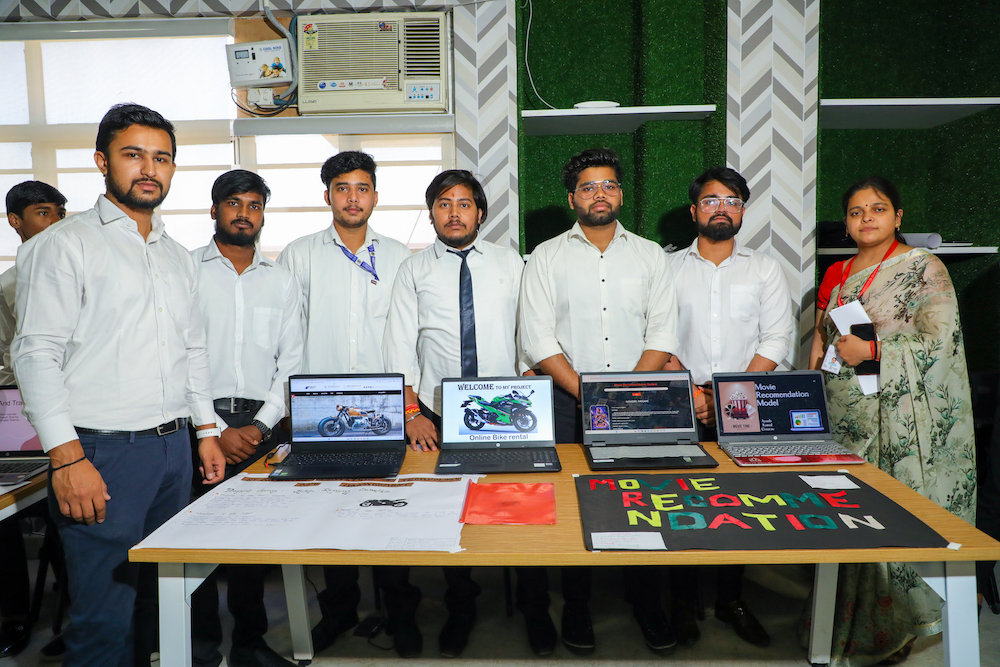
Image – 10 Project Exhibition at SAITM Campus
Pursuing an MBA in Information Technology (IT) through distance education in India is a practical choice for working professionals and individuals seeking flexibility in their studies.
Distance learning mode programs are structured to offer the same comprehensive curriculum found in traditional MBA degrees, enabling students to manage their studies alongside personal and professional obligations.
Here’s an overview of what to expect with MBA IT distance education in India, including key aspects of programs, popular institutions offering these courses, and their benefits:
Key Aspects of MBA IT Distance Education Programs
Course Curriculum: Typically mirrors that of on-campus MBA degrees, covering core business disciplines integrated with specialized IT subjects such as Data Management, Information Systems, E-Commerce, and software Project Management.
Duration: Most programs span two years, but many institutions offer flexible pacing that can extend up to three or four years, depending on the student’s schedule.
Delivery Method: Practical courses are typically delivered through online platforms, offering a variety of learning methods such as recorded lectures, live webinars, interactive sessions, and virtual classrooms. Additionally, some programs may incorporate occasional residential workshops or mandate on-campus exams.
Assessment: Involves online assignments, projects, and proctored examinations that can either be online or at designated examination centers.
Admission Requirements
Educational Background: A bachelor’s degree from a recognized university, typically with a minimum aggregate mark (often around 50%).
Work Experience: Not mandatory for all programs, but preferred by some, especially for executive MBA courses.
Entrance Exams: Few distance education programs may require scores from tests like CAT, MAT, or institution-specific entrance tests, though many waive this requirement.
Benefits of MBA IT Distance Education
Flexibility: Allows students to study at their own pace and maintain a work-study balance.
Cost-Effective: Generally more affordable than full-time MBA courses with reduced tuition fees and minimal travel and accommodation costs.
Career Advancement: Enables professionals to enhance their qualifications and skills without taking a break from their jobs, offering better career progression opportunities.
Networking: Many platforms offer discussion forums, group projects, and interactive sessions that help in building a professional network even in a virtual setting.
Eligibility Criteria for MBA IT Distance Education

Image – 11 Best College Award
Pursuing an MBA in Information Technology through distance education can be a flexible option for professionals looking to advance their careers while continuing to work. The eligibility criteria for enrolling in an MBA IT distance education program can vary by institution, but here are the common requirements that most universities and colleges typically ask for:
1. Educational Qualification
- Bachelor’s Degree: Candidates must possess an undergraduate degree from a recognized university or institution. The degree can be in any field, although having a background in technology, computer science, or business may be beneficial.
- Minimum Marks: Most institutions require a minimum percentage in the undergraduate degree, typically around 50% to 55%, although this can vary.
2. Work Experience
- Work Experience: While not always mandatory, some institutions prefer or require candidates to have professional work experience. This experience might not need to be in IT specifically but having relevant experience can enhance understanding of the coursework and its application in real-world scenarios.
3. Entrance Exams
- Entrance Exams: Not all distance education programs require entrance examinations. However, some universities might require scores from exams like the CAT, MAT, or their own institutional entrance tests, particularly for admissions into more competitive programs.
4. Proficiency in English
- Language Proficiency: For programs taught in English, proficiency in the language is essential. Requirements for demonstrating proficiency can vary; some institutions may ask for scores from English proficiency tests if the candidate’s prior education was not in English.
5. Technology Requirements
- Technical Equipment: Since the program is offered through distance learning, candidates must have access to a reliable internet connection and a computer that meets the software and hardware requirements of the course.
6. Age Limit
- Age Restrictions: Generally, there are no strict age limits for enrollment in distance education programs. However, some universities may set their own age criteria.
Application Process
- Application Form: Candidates need to fill out an application form, which may be available online or through postal services depending on the university.
- Documentation: Submission of academic transcripts, work experience certificates (if applicable), and identity proofs are commonly required.
- Fees: Payment of application and tuition fees as specified by the institution.
Selection Criteria
- Selection Process: Selection is typically based on the eligibility criteria and sometimes the performance in an entrance test or interview. Some institutions also consider professional experience and personal interviews, especially for executive MBA courses.
MBA IT Distance Education Fee Structure
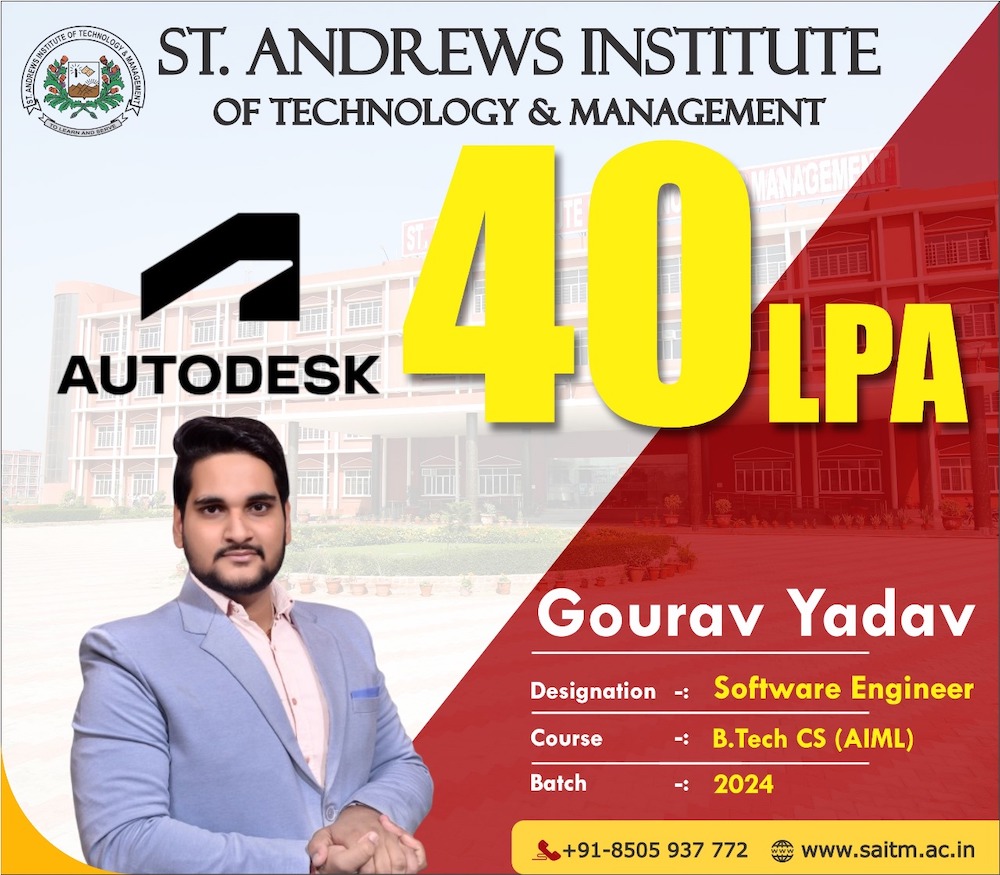
Image – 12 Highest Package
The fee structure for an MBA in IT through distance education in India varies widely depending on the institution offering the program. Generally, distance education tends to be more affordable compared to on-campus programs, making it a popular choice for working professionals.
Here’s a general idea of what you can expect in terms of fees for distance learning MBA programs in IT:
General Fee Range
- Affordable Programs: Fees can start as low as INR 15,000 to INR 30,000 per year at some open universities or lesser-known institutions.
- Moderate Fee Programs: Many recognized universities and private institutions charge between INR 50,000 to INR 1 lakh per year.
- Higher Fee Programs: More prestigious institutions or those with a strong reputation in distance learning might charge between INR 1 lakh to INR 2 lakh for the entire program.
Additional Costs
- Admission Fees: Some institutions may charge a one-time admission fee.
- Examination Fees: There may be separate charges for examinations, payable each semester or year.
- Study Material Costs: Some courses might require additional payments for study materials or access to online resources.
- Technology Fees: As these are online programs, some institutions might charge for the use of their digital platforms or learning management systems.
Financial Aid and Scholarships
- While less common for distance education programs compared to full-time on-campus programs, some institutions may offer scholarships or financial aid based on merit or financial need.
Choosing the Right Program
- Accreditation: Ensure the program and the institution are accredited by a recognized body.
- Curriculum Relevance: Evaluate whether the curriculum meets current industry standards and includes up-to-date technological and business practices.
- Flexibility and Support: Consider the flexibility of the program schedule and the level of academic and technical support provided to distance learners.
MBA IT Distance Education Admission Process

Image – 13 Sports Day Event
The process for securing admission to a distance MBA in Information Technology in India may differ slightly between institutions, yet it usually adheres to a common sequence of steps.
Here’s an overview of the typical admission process for distance learning MBA programs in IT:
1. Research and Select Programs
- Identify Institutions: Begin by exploring institutions that provide a distance MBA in Information Technology. Evaluate aspects such as accreditation, the expertise of faculty, curriculum details, and feedback from alumni.
- Evaluate Program Details: Look into the specifics of each program, including course content, duration, flexibility, delivery methods (online or correspondence), and cost.
2. Check Eligibility Criteria
- Educational Qualifications: Most programs necessitate a graduation credential from a recognized university. The field of study in the undergraduate qualification is typically not restricted.
- Work Experience: Some institutions may prefer or require candidates to have work experience, though it is not mandatory for all programs.
- Entrance Exams: Although less typical for distance MBA programs, some universities might still request scores from MBA entrance examinations such as the CAT, MAT, or proprietary university-specific tests.
3. Prepare Application Materials
- Documentation: Gather all necessary documents such as academic transcripts, degree certificates, work experience certificates (if applicable), and identity proof.
- Statement of Purpose/Essays: Some programs may require a statement of purpose or essays explaining why you want to enroll in the program and how it fits into your career goals.
- Letters of Recommendation: Although not commonly required for distance education, some programs might request recommendations.
4. Submit Application
- Application Form: Complete the application form, which can typically be found on the institution’s website.
- Application Fee: Pay the necessary application fees. This can usually be done online.
5. Undergo Selection Process
- Review Process: The university will review your application and check if you meet the eligibility criteria.
- Interviews: Some institutions might conduct interviews, though this is rare for distance education programs.
- Entrance Tests: If applicable, prepare for and take any required entrance tests.
6. Acceptance and Enrollment
- Admission Offer: If your application is successful, you will receive an admission offer from the institution.
- Acceptance: You need to accept the offer by the given deadline, which might involve paying a deposit or the first installment of the tuition fee.
- Registration: Complete any final registration steps, which may include submitting final documents.
7. Orientation and Commencement of Classes
- Orientation: Some institutions conduct an online orientation for new students to familiarize them with the digital platforms and resources.
- Start of Classes: Access course materials and begin attending virtual classes as per the schedule.
Additional Tips
- Stay Updated: Keep an eye on application deadlines and any specific admission announcements from the universities.
- Technical Requirements: Ensure you have the necessary technology setup, such as a reliable internet connection and a suitable computer.
By following these steps and preparing thoroughly, you can successfully navigate the admission process for an MBA in IT through distance education in India. Remember to check specific requirements and processes directly on the website of the institution you are interested in as they can vary.
MBA in IT Average Salary in India

Image – 14 Management IT Labs
The average salary for MBA graduates specializing in Information Technology in India can vary considerably, driven by several factors. These encompass the prestige of the educational institution, the candidate’s previous professional background, the geographical context, and the specific role and industry within both the courses of IT systems.
However, we can outline a general expectation based on industry trends:
Entry-Level Graduates
For those just starting out, especially from mid-tier business schools, the average salary can range from INR 7 lakh to INR 12 lakh per annum. These roles typically include positions such as IT Analyst, Systems Manager, or Project Coordinator.
Graduates from Top Business Schools
Graduates from top-tier institutions such as the IIMs, ISB, or those with strong reputations for their MBA IT programs can expect significantly higher starting salaries.
The average salary range for these graduates can be between INR 15 lakh to INR 30 lakh per annum, sometimes going even higher depending on the role and the employer’s value of the MBA credential.
Roles can include IT Consultant, IT Project Manager, Product Manager, or Business Development Manager with tech firms.
Experienced Professionals
For MBA graduates who also bring significant prior work experience to their new roles, salaries can start even higher. In senior management or specialist roles, such as Chief Technology Officer (CTO) or IT Strategy Consultant, salaries can range from INR 20 lakh to INR 50 lakh per annum or more, particularly in large companies or multinational corporations.
Factors Influencing Salary:
Institution: The brand and network of the institution can significantly impact salary, as graduates from more prestigious schools often have access to better opportunities through campus placements.
Location: Salaries in metropolitan areas like Bangalore, Mumbai, and Hyderabad are typically higher due to the concentration of tech companies and startups.
Industry: Salaries can vary across different industries. For instance, MBA grads working in finance or consulting sectors may earn more than those in manufacturing or education.
Role and Responsibilities: Higher responsibilities involving strategic management, decision-making, and technical expertise tend to command higher salaries.
Industry Demand
The demand for MBA graduates with expertise in IT is consistently strong, as more businesses rely on technology to drive operations and strategy. This demand helps to bolster salary levels, particularly for those who can merge technology with effective business strategies.
While these figures provide a ballpark, actual salaries can differ based on many other variables including market conditions, individual negotiation skills, and specific employer budget constraints.
FAQs
What is MBA in information technology?
An Master of Business Administration (MBA) in Information Technology is a graduate degree that merges business management skills with specialized IT knowledge. It prepares students for leadership roles by covering areas like technology management, data analytics, and IT project management. Graduates can pursue careers such as CIO, IT Manager, or IT Consultant, focusing on aligning IT initiatives with business objectives to drive organizational growth and efficiency.
Is MBA in Information Technology worth IT?
Yes, an Master of Business Administration (MBA) in Information Technology is highly valuable, particularly in our technology-centric economy. It provides graduates with crucial leadership abilities and IT proficiency, preparing them for roles such as CIO or IT Manager. This degree boosts career progression, increases earning prospects, and offers extensive networking opportunities, making it a smart choice for those looking to strategically integrate business and technology.
Which MBA is best for IT sector?
An MBA Information Technology is an ideal choice for the IT sector, seamlessly merging management skills with IT expertise. Graduates are equipped for successful careers in leadership roles such as CIO or IT Consultant. This program specifically emphasizes integrating IT solutions with business strategies, cultivating the required skills for navigating tech-driven business environments.
Who is eligible for MBA in IT?
To qualify for an MBA Information Technology, candidates need to hold an undergraduate degree from an accredited college or university, usually with a minimum GPA or percentage requirement. Many programs also value or require professional experience in IT or related areas. Additionally, scores from graduate entrance examinations such as the CAT and MAT are often necessary for admission.
Can I go for an MBA in the IT field after a BBA?
Yes, you can pursue an MBA in the IT field after completing a Bachelor of Business Administration (BBA). A BBA provides a solid foundation in business principles, which complements the management focus of an MBA. Specializing in IT during your MBA will enhance your technological expertise, making you well-suited for managerial roles at the intersection of business and technology.
What is Online MBA?
An Online MBA, a graduate business degree program primarily delivered through online platforms, provides flexibility for students to study from anywhere. Typically covering similar curriculum as traditional MBA degrees, it also emphasizes the development of soft skills through virtual classrooms and discussions, benefiting working professionals seeking career advancement.


